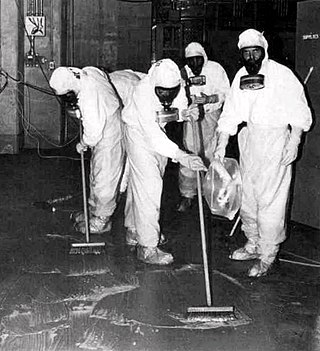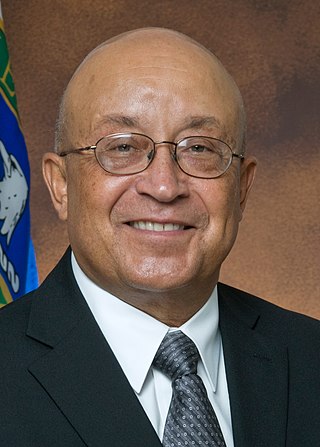
The Nuclear Regulatory Commission (NRC) is an independent agency of the United States government tasked with protecting public health and safety related to nuclear energy. Established by the Energy Reorganization Act of 1974, the NRC began operations on January 19, 1975, as one of two successor agencies to the United States Atomic Energy Commission. Its functions include overseeing reactor safety and security, administering reactor licensing and renewal, licensing radioactive materials, radionuclide safety, and managing the storage, security, recycling, and disposal of spent fuel.

The Health and Safety Executive (HSE) is a UK government agency responsible for the encouragement, regulation and enforcement of workplace health, safety and welfare, and for research into occupational risks in Great Britain. It is a non-departmental public body of the United Kingdom with its headquarters in Bootle, England. In Northern Ireland, these duties lie with the Health and Safety Executive for Northern Ireland. The HSE was created by the Health and Safety at Work etc. Act 1974, and has since absorbed earlier regulatory bodies such as the Factory Inspectorate and the Railway Inspectorate though the Railway Inspectorate was transferred to the Office of Rail and Road in April 2006. The HSE is sponsored by the Department for Work and Pensions. As part of its work, HSE investigates industrial accidents, small and large, including major incidents such as the explosion and fire at Buncefield in 2005. Though it formerly reported to the Health and Safety Commission, on 1 April 2008, the two bodies merged.

Dounreay is a small settlement and the site of two large nuclear establishments on the north coast of Caithness in the Highland area of Scotland. It is on the A836 road nine miles west of Thurso.

Nuclear safety is defined by the International Atomic Energy Agency (IAEA) as "The achievement of proper operating conditions, prevention of accidents or mitigation of accident consequences, resulting in protection of workers, the public and the environment from undue radiation hazards". The IAEA defines nuclear security as "The prevention and detection of and response to, theft, sabotage, unauthorized access, illegal transfer or other malicious acts involving nuclear materials, other radioactive substances or their associated facilities".
As of 2022, nuclear power is provided by six commercial nuclear power plants in Pakistan. Pakistan is the first Muslim majority country in the world to construct and operate civil nuclear power plants. The Pakistan Atomic Energy Commission (PAEC), the scientific and nuclear governmental agency, is solely responsible for operating these power plants. As of 2018, the electricity generated by commercial nuclear power plants constitutes roughly 7.5% of electricity generated in Pakistan, Pakistan is not a party to the Nuclear Non-Proliferation Treaty but is a member of the International Atomic Energy Agency. Pakistan plans on constructing 32 nuclear power plants by 2050 and envisions 40,000 MW of nuclear power generation.

Nuclear safety in the United States is governed by federal regulations issued by the Nuclear Regulatory Commission (NRC). The NRC regulates all nuclear plants and materials in the United States except for nuclear plants and materials controlled by the U.S. government, as well those powering naval vessels.

The Atomic Energy Regulatory Board (AERB) was constituted on 15 November 1983 by the President of India by exercising the powers conferred by Section 27 of the Atomic Energy Act, 1962 to carry out certain regulatory and safety functions under the Act. The regulatory authority of AERB is derived from the rules and notifications promulgated under the Atomic Energy Act, 1962 and the Environmental (Protection) Act, 1986. The headquarters is in Mumbai.
The International Nuclear Regulators' Association (INRA) was established in January 1997 and is an association of the most senior officials of the nuclear regulatory authorities of the following countries:
Martyn Thomas CBE FREng FIET FRSA is a British independent consultant and software engineer.
Arnold "Arnie" Gundersen is a former nuclear industry executive, and engineer with more than 44 years of nuclear industry experience who became a whistleblower in 1990. Gundersen has written dozens of expert reports for nongovernment organizations and the state of Vermont. Gunderson was a licensed reactor operator from 1971-1972 on Rensselaer Polytechnic Institute's zero-power open-pool university research reactor at the Reactor Critical Facility in Schenectady, New York, where he was a nuclear engineering graduate student.

Gregory B. Jaczko is a physicist who was chairman of the U.S. Nuclear Regulatory Commission (NRC) from 2005 to 2012. While at the NRC, he voted against the opening of new nuclear plants and an inspector general report found that he unilaterally and improperly sought to block the Yucca Mountain nuclear waste repository project from advancing. After leaving the NRC, Jaczko called for a global ban on nuclear power.
The Office for Nuclear Regulation (ONR) is the regulator for the nuclear industry in the United Kingdom. It is an independent statutory corporation whose costs are met by charging fees to the nuclear industry. The ONR reports to the Department for Work and Pensions, although it also worked closely with the now-defunct Department of Energy and Climate Change.
Frederick Michael Burdekin is a British civil engineer, and emeritus professor at University of Manchester Institute of Science and Technology and the University of Manchester.
Geoffrey Frederick Hewitt was a British chemical engineer, and Emeritus Professor at Imperial College London, where from 1993 to 1999 he was the Courtaulds Professor of chemical engineering.
Professor Jean Venables CBE, BSc (Eng), MSc, DSc, FREng, CEng, CEnv, FICE, FCGI, MCIWEM is a British civil engineer who in November 2008 became the 144th President of the Institution of Civil Engineers, the first woman to be elected to the position.

Jason Meredith Reese (24 June 1967 – 8 March 2019 was a British engineering scientist, and Regius Professor of Engineering at the University of Edinburgh.
Colin P. Smith CBE FRS FREng FRAeS FIMechE was director of engineering and technology at Rolls-Royce plc.

Warren Fletcher "Pete" Miller Jr. is an American nuclear engineer known for his work in the areas of computational physics, radioactive waste management, transport theory, nuclear reactor design and analysis, and the management of nuclear research and development programs.
The Uganda Atomic Energy Council (UAEC) is a corporate body, established by the Atomic Energy Act of 2008, which was enacted by the Parliament of Uganda.
In 2016 the Women's Engineering Society (WES), in collaboration with the Daily Telegraph, produced an inaugural list of the United Kingdom's Top 50 Influential Women in Engineering, which was published on National Women in Engineering Day on 23 June 2016. The event was so successful it became an annual celebration. The list was instigated by Dawn Bonfield MBE, then Chief Executive of the Women's Engineering Society. In 2019, WES ended its collaboration with the Daily Telegraph and started a new collaboration with The Guardian newspaper.








